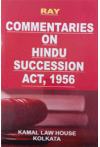- Author(s): Ray , S.R. Roy
- Publisher: Kamal Law House
- Edition: 6 Ed, Rp 2023
- Approx. Pages 624 + Contents
- Format Hardbound
- Approx. Product Size 24 x 16 cms
- Delivery Time 3-5 working days (within Kerala & South India) (Others 7-9 days)
- Shipping Charge Extra (see Shopping Cart)
......................................................................................................................................
Description
Ray’s Commentaries on the Hindu Succession Act is a very popular and exhaustive book on the Hindu Succession Act, 1956. In the last Edition, important amendments to the Act by the Hindu Succession (Amendment) Act, 2005 which came into force with effect from 09.09.2005 by substituting a new Section 6 and deleting Sections 23 and 24 of the Act had been noted. In this present Edition, some important decisions of Section 6 has also enunciated to new provisions of Section 6 of the Act. It has obliterated all the vestiges of gender discrimination in the Act originally, by giving both the son and the daughter equal right in the Mitakshara coparcenary, both the son and the daughter shall inherit the Mitakshara father and such right has been declared from birth of both the son and the daughter. Section 23 also originally enunciated that the daughter would not be entitled to partition family dwelling house and it is only when the son sought for partition of the family dwelling house the daughter would get a share to which she is entitled under the Act. Now, Section 23 has been deleted and the Supreme Court has clearly held in several decisions that this deletion is retrospective in nature and if originally the daughter’s suit for partition of the family dwelling house was held to be invalid but because of this amendment even if the suit has been filed prior to the deletion of Section 23 from the Act, and if the said suit is pending either before the Appellate Court or before the High Court, the benefit of this amendment will enure to the daughter. Thus even if there was embargo, but if the embargo lifted during the pendency of the said suit, the daughter will get the benefit of her suit for partition of the family dwelling house and the same is also be held to be maintainable.
In this new Edition, special efforts have been made to incorporate the latest decision of the Supreme Court in Vineeta Sharma v Rakesh Sharma (2020)9 SCC 1 dealt exhaustively and including the amendment provisions of the Hindu Succession (Amendment) Act, 2005.
......................................................................................................................................
Table of Contents
Preface To The Sixth Edition
Table Of Cases
Law As It Was Prior To The Hindu Succession Act, 1956
1. Schools of Hindu Law
2. Classification of property
3. Nature of coparcenary under the Mitakshara and Dayabhaga Schools
4. Devolution of property under the Mitakshara Law
5. Devolution of property under the Dayabhaga Law
6. Separate or self-acquired property
7. Female heirs
8. Stridhana
9. Inherited property of a woman
10. Reversioners
11. Incidents of limited estate
12. Two important principles
Chapter I : Preliminary
Sections
1. Short title and extent
2. Application of Act
3. Definitions and interpretations
4. Overriding effect of Act
Chapter II : Intestate Succession
General
5. Act not to apply to certain properties
6. Devolution of interest in coparcenary property
7. Devolution of interest in the property of a tarwad, tavazhi, kutumba, kavaru or illom
Sections
8. General rules of succession in the case of males
9. Order of succession among heirs in the Schedule
10. Distribution of property among heirs in Class I of the Schedule
11. Distribution of property among heirs in Class II of the Schedule
12. Order of succession among agnates and cognates
13. Computation of degrees
14. Property of a female Hindu to be her absolute property
15. General rules of succession in the case of female Hindus
16. Order of succession and manner of distribution among heirs of a female Hindu
17. Special provisions respecting persons governed by Marumakkattayam and Aliyasantana laws
General provisions relating to succession
18. Full-blood preferred to half-blood.
19. Mode of succession of two or more heirs
20. Right of child in womb
21. Presumption in cases of simultaneous deaths
22. Preferential right to acquire property in certain cases
23. [Omitted]
24. [Omitted
25. Murderer disqualified
26. Convert's descendants disqualified
27. Succession when heir disqualified.
28. Disease, defect, etc. not to disqualify
Escheat
29. Failure of heirs
Chapter III : Testamentary Succession
30. Testamentary Succession
Chapter IV : Repeals
31. [Repealed.] Repealed by the Repealing and Amending Act, 1960 (58 of 1960), section 2 and First Schedule
The Schedule
Heirs in Class I and Class II
Appendix
1. Indian Succession Act, 1925
2. Special Marriage Act, 1954
3. Hindu Women's Rights to Property Act, 1937
4. Hindu Inheritance (Removal of Disabilities) Act, 1928
5. Caste Disabilities Removal Act, 1850
6. Hindu Widows' Remarriage Act, 1856
Index
......................................................................................................................................
Author Details
Ray
S.R.Roy, Former Judge, Calcutta High Court

